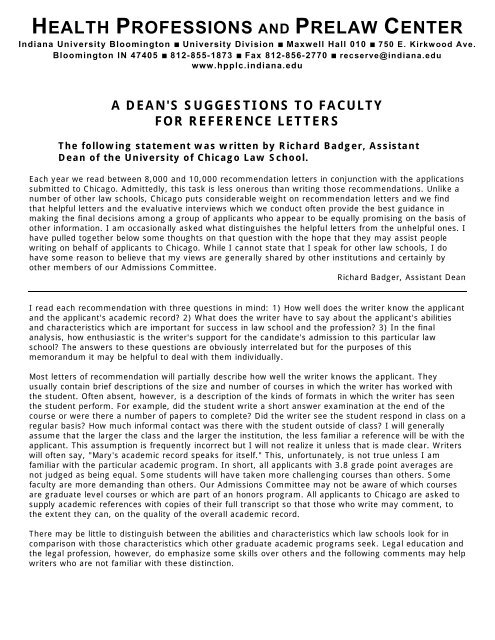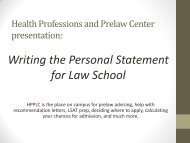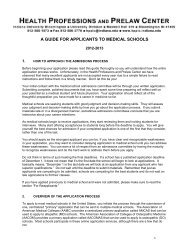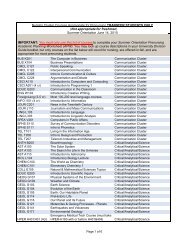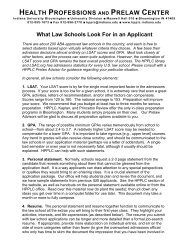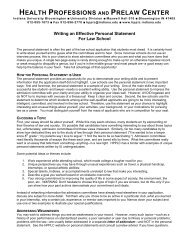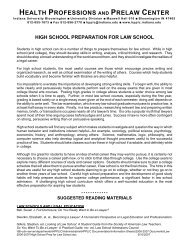A Dean's Suggestions to Faculty for Reference Letters. - Health ...
A Dean's Suggestions to Faculty for Reference Letters. - Health ...
A Dean's Suggestions to Faculty for Reference Letters. - Health ...
You also want an ePaper? Increase the reach of your titles
YUMPU automatically turns print PDFs into web optimized ePapers that Google loves.
HEALTH PROFESSIONS AND PRELAW CENTER<br />
Indiana University Blooming<strong>to</strong>n ■ University Division ■ Maxwell Hall 010 ■ 750 E. Kirkwood Ave.<br />
Blooming<strong>to</strong>n IN 47405 ■ 812-855-1873 ■ Fax 812-856-2770 ■ recserve@indiana.edu<br />
www.hpplc.indiana.edu<br />
A DEAN'S SUGGESTIONS TO FACULTY<br />
FOR REFERENCE LETTERS<br />
The following statement was written by Richard Badger, Assistant<br />
Dean of the University of Chicago Law School.<br />
Each year we read between 8,000 and 10,000 recommendation letters in conjunction with the applications<br />
submitted <strong>to</strong> Chicago. Admittedly, this task is less onerous than writing those recommendations. Unlike a<br />
number of other law schools, Chicago puts considerable weight on recommendation letters and we find<br />
that helpful letters and the evaluative interviews which we conduct often provide the best guidance in<br />
making the final decisions among a group of applicants who appear <strong>to</strong> be equally promising on the basis of<br />
other in<strong>for</strong>mation. I am occasionally asked what distinguishes the helpful letters from the unhelpful ones. I<br />
have pulled <strong>to</strong>gether below some thoughts on that question with the hope that they may assist people<br />
writing on behalf of applicants <strong>to</strong> Chicago. While I cannot state that I speak <strong>for</strong> other law schools, I do<br />
have some reason <strong>to</strong> believe that my views are generally shared by other institutions and certainly by<br />
other members of our Admissions Committee.<br />
Richard Badger, Assistant Dean<br />
I read each recommendation with three questions in mind: 1) How well does the writer know the applicant<br />
and the applicant's academic record? 2) What does the writer have <strong>to</strong> say about the applicant's abilities<br />
and characteristics which are important <strong>for</strong> success in law school and the profession? 3) In the final<br />
analysis, how enthusiastic is the writer's support <strong>for</strong> the candidate's admission <strong>to</strong> this particular law<br />
school? The answers <strong>to</strong> these questions are obviously interrelated but <strong>for</strong> the purposes of this<br />
memorandum it may be helpful <strong>to</strong> deal with them individually.<br />
Most letters of recommendation will partially describe how well the writer knows the applicant. They<br />
usually contain brief descriptions of the size and number of courses in which the writer has worked with<br />
the student. Often absent, however, is a description of the kinds of <strong>for</strong>mats in which the writer has seen<br />
the student per<strong>for</strong>m. For example, did the student write a short answer examination at the end of the<br />
course or were there a number of papers <strong>to</strong> complete? Did the writer see the student respond in class on a<br />
regular basis? How much in<strong>for</strong>mal contact was there with the student outside of class? I will generally<br />
assume that the larger the class and the larger the institution, the less familiar a reference will be with the<br />
applicant. This assumption is frequently incorrect but I will not realize it unless that is made clear. Writers<br />
will often say, "Mary's academic record speaks <strong>for</strong> itself." This, un<strong>for</strong>tunately, is not true unless I am<br />
familiar with the particular academic program. In short, all applicants with 3.8 grade point averages are<br />
not judged as being equal. Some students will have taken more challenging courses than others. Some<br />
faculty are more demanding than others. Our Admissions Committee may not be aware of which courses<br />
are graduate level courses or which are part of an honors program. All applicants <strong>to</strong> Chicago are asked <strong>to</strong><br />
supply academic references with copies of their full transcript so that those who write may comment, <strong>to</strong><br />
the extent they can, on the quality of the overall academic record.<br />
There may be little <strong>to</strong> distinguish between the abilities and characteristics which law schools look <strong>for</strong> in<br />
comparison with those characteristics which other graduate academic programs seek. Legal education and<br />
the legal profession, however, do emphasize some skills over others and the following comments may help<br />
writers who are not familiar with these distinction.
Language is the lawyer's working <strong>to</strong>ol and the best law students are those who have the ability <strong>to</strong> write<br />
and speak with precision, fluency, and economy. Not only must the student be able <strong>to</strong> communicate his or<br />
her own thoughts clearly, but he or she must have the ability <strong>to</strong> read and listen carefully with an eye and<br />
ear <strong>for</strong> fine points and subtle distinctions.<br />
Legal education demands well developed analytical skills and the ability <strong>to</strong> juggle multiple variables. Legal<br />
reasoning at one time or another involves deductive reasoning, inductive reasoning, and reasoning by<br />
analogy. The best students can think independently, have the ability <strong>to</strong> cut through <strong>to</strong> the essentials and<br />
can distinguish the relevant from the extraneous. Contrary <strong>to</strong> what many believe about the law, there are<br />
few clear and distinct legal rules. A <strong>to</strong>lerance <strong>for</strong> this ambiguity and the ability <strong>to</strong> recognize exceptions and<br />
qualifications which may modify general rules are characteristics of successful law students. In short, a<br />
reference should consider whether an applicant is likely <strong>to</strong> be stimulated or frustrated by questions where<br />
there are not ”correct" answers.<br />
The nature of legal education -- large classes, competitive pressure, and substantial amounts of material<br />
<strong>to</strong> be mastered -- may make some personality traits more important in law school than in other academic<br />
programs. Students will often learn as much from their classmates as from the faculty. Thus, interaction<br />
among students is an important feature of legal education and those who enjoy engaging in discussion in<br />
and outside of class are more likely <strong>to</strong> flourish in this atmosphere. The student who is intellectually alive<br />
and curious is more likely <strong>to</strong> sustain academic progress where there is little rein<strong>for</strong>cement between<br />
examinations. A student must be diligent and well organized <strong>to</strong> handle large quantities of material. A well<br />
developed sense of humor and a mature attitude are particularly helpful in adjusting <strong>to</strong> the pressures<br />
which many students will experience in law school.<br />
Perhaps the most difficult task in reading a recommendation is interpreting the significance of such<br />
statements as "excellent," "outstanding," "highest recommendation," and "recommend without<br />
qualification." Such terms may indicate meaningful distinctions among applicants supported by the same<br />
writer but we may not be familiar with the way in which a particular reference ranks applicants. This<br />
uncertainty can be compounded where we receive a standard letter which is submitted <strong>to</strong> a number of<br />
different law schools. Is the degree of support directed <strong>to</strong> the most selective or the least selective of the<br />
schools <strong>to</strong> which the applicant has applied? Occasionally we will know the faculty member writing a<br />
recommendation. In those situations it is generally easier <strong>to</strong> evaluate the degree of enthusiasm <strong>for</strong> a<br />
particular applicant. It is far more often the case, however, that our most significant contact with an<br />
institution will be familiarity with its graduates who have attended the Law School in recent years. Thus, a<br />
comparison of an applicant with other graduates we know from the same institution may provide us with a<br />
more accurate assessment of the applicant's potential <strong>for</strong> success at Chicago than the objective fac<strong>to</strong>rs of<br />
the Law School Admission Test score and the undergraduate grade point average. In weighing the overall<br />
assessment made by a reference it is also helpful <strong>to</strong> know how confident the writer is of his or her own<br />
judgment about a particular applicant.<br />
As we are occasionally reminded by those who submit recommendations, the task of ultimately selecting<br />
the most promising students <strong>for</strong> this law school is ours and not theirs. Helpful letters, however, can make<br />
this task easier.<br />
You may email HPPLC at recserve@indiana.edu <strong>to</strong> ask questions, communication with advisors, and check<br />
your recommendation file.<br />
NOTE: This document has been prepared <strong>for</strong> Indiana University - Blooming<strong>to</strong>n students by the <strong>Health</strong> Professions and Prelaw Center.<br />
Please note that specific requirements and policies can change at any time without notice. Students are responsible <strong>for</strong> obtaining the<br />
most current in<strong>for</strong>mation directly from the application services, schools, and programs in which they have an interest.<br />
\\Bl-udiv-server\departments\HPPLIC\Administrative\HPPLIC Documentation\Recommendation <strong>for</strong>ms\Revised 2006-2007\Deans sugg <strong>for</strong> recom ltrs.doc<br />
5/10/2007


